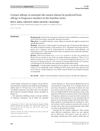December 2024 in “Jurnal Ilmiah Farmasi (Scientific Journal of Pharmacy)” Nanotechnology could improve lavender oil's effectiveness, but more research is needed.
 9 citations,
March 2011 in “Oxidative stress and disease”
9 citations,
March 2011 in “Oxidative stress and disease” Some herbal treatments are effective for skin disorders, but more research and regulation are needed.
34 citations,
January 2022 in “Molecules/Molecules online/Molecules annual” Natural ingredients in cosmeceuticals are beneficial for skin and hair health with few side effects.
 January 2024 in “Deleted Journal”
January 2024 in “Deleted Journal” Essential oils like lavender, chamomile, and bergamot help manage stress and improve well-being.
 March 2023 in “International Journal of Advanced Research in Science, Communication and Technology”
March 2023 in “International Journal of Advanced Research in Science, Communication and Technology” Various medicinal plants like Polygonum multiflorum, Red ginseng extract, and Zizyphus jujuba can potentially treat hair loss, offering benefits like low cost and multiple ways of working. Other effective natural substances include Pygeum africanum, Seneroa, Urtica dioica, and more.
 December 2023 in “Medicine and Materials”
December 2023 in “Medicine and Materials” Essential oils are increasingly used in cosmetics for their natural benefits but must be used carefully to avoid skin reactions.
 183 citations,
January 2018 in “Cosmetics”
183 citations,
January 2018 in “Cosmetics” Essential oils in cosmetics can offer benefits but may cause allergies and should be used carefully.
 15 citations,
October 2021 in “Frontiers in Pharmacology”
15 citations,
October 2021 in “Frontiers in Pharmacology” Natural volatiles and essential oils have health benefits and can enhance the effects of some medicines, but more research is needed to understand how they work and their possible side effects.
 December 2024 in “Asian Journal of Pharmaceutical and Clinical Research”
December 2024 in “Asian Journal of Pharmaceutical and Clinical Research” Combining synthetic and herbal treatments may help with hair loss, but more research is needed.
 57 citations,
October 2021 in “Journal of ethnopharmacology”
57 citations,
October 2021 in “Journal of ethnopharmacology” Indian herbal medicine shows promise for treating skin diseases but needs more research to prove effectiveness.
 3 citations,
April 2019 in “bioRxiv (Cold Spring Harbor Laboratory)”
3 citations,
April 2019 in “bioRxiv (Cold Spring Harbor Laboratory)” Beta-caryophyllene, found in essential oils, helps wounds heal better in multiple ways.
 67 citations,
December 2019 in “PloS one”
67 citations,
December 2019 in “PloS one” Beta-caryophyllene helps improve wound healing in mice, especially in females.
 1 citations,
December 2013 in “Turkderm”
1 citations,
December 2013 in “Turkderm” Use of cosmeceuticals during pregnancy and breastfeeding is not recommended due to insufficient safety data.
 July 2024 in “Annals of Phytomedicine An International Journal”
July 2024 in “Annals of Phytomedicine An International Journal” Herbal ingredients like aloe vera and hibiscus can help with hair problems like hair loss and dandruff.
 3 citations,
July 2021 in “International journal of pharmaceutical chemistry and analysis”
3 citations,
July 2021 in “International journal of pharmaceutical chemistry and analysis” Medicinal plants like Aloe, Amla, and Coconut oil help with hair and skin care.
 39 citations,
June 2017 in “Journal of Applied Research on Medicinal and Aromatic Plants”
39 citations,
June 2017 in “Journal of Applied Research on Medicinal and Aromatic Plants” Plant-based ingredients are effective and safe for modern skincare products.
 December 2023 in “International Journal of Science and Research (IJSR)”
December 2023 in “International Journal of Science and Research (IJSR)” Herbal treatments are effective and preferred for hair loss with fewer side effects.
 16 citations,
September 2018 in “Journal of Ethnopharmacology”
16 citations,
September 2018 in “Journal of Ethnopharmacology” Plant-based remedies may treat hair loss by reducing inflammation and improving insulin resistance.
 4 citations,
October 2016
4 citations,
October 2016 Herbs like aloe vera and amla are effective and safe for treating hair loss.
 1 citations,
January 2017 in “Social Science Research Network”
1 citations,
January 2017 in “Social Science Research Network” The document suggests creating a secure database for indigenous knowledge and recommends that the TKDL actively fight patents that slightly alter traditional knowledge.
 January 2023 in “International Journal of Research Publication and Reviews”
January 2023 in “International Journal of Research Publication and Reviews” Some herbal ingredients like linalool and tea tree oil have anti-dandruff properties and are safe for use in shampoos.
 23 citations,
January 2016 in “Contact Dermatitis”
23 citations,
January 2016 in “Contact Dermatitis” Allergies to some essential oils may not be found with standard fragrance tests.
 3 citations,
June 2004 in “Alternative and Complementary Therapies”
3 citations,
June 2004 in “Alternative and Complementary Therapies” The document concludes that hair loss is influenced by genetics and other factors, and while treatments like finasteride can help, they have limitations and side effects.
Essential oils can help hair grow and are safer and more accessible than other treatments.
 1 citations,
August 2004 in “Alternative & complementary therapies”
1 citations,
August 2004 in “Alternative & complementary therapies” Non-drug methods like diet, supplements, and aromatherapy can help manage hair loss and its emotional impact.
 122 citations,
November 1998 in “Archives of Dermatology”
122 citations,
November 1998 in “Archives of Dermatology” Aromatherapy with certain essential oils is a safe and effective treatment for hair growth in alopecia areata patients.
 39 citations,
September 2013 in “Journal of Cosmetic Dermatology”
39 citations,
September 2013 in “Journal of Cosmetic Dermatology” Herbs can potentially treat hair loss by inhibiting a key enzyme and promoting hair growth, and deficiencies in zinc, biotin, and iron are linked to hair loss.
 January 2015 in “Springer eBooks”
January 2015 in “Springer eBooks” Some alternative treatments may help with hair loss, but more evidence is needed to confirm their effectiveness.
 April 2024 in “International Journal of Research Publication and Reviews”
April 2024 in “International Journal of Research Publication and Reviews” Alopecia areata causes hair loss with varied treatment responses and frequent relapses.
 1 citations,
October 2023 in “Clinical, cosmetic and investigational dermatology”
1 citations,
October 2023 in “Clinical, cosmetic and investigational dermatology” Traditional treatment for pediatric alopecia areata is most effective and should be first choice.


























